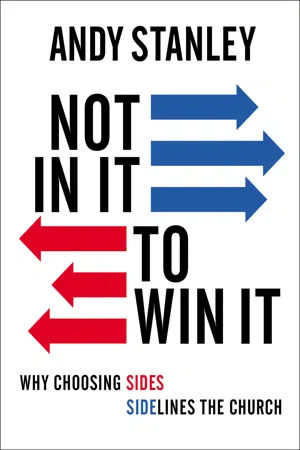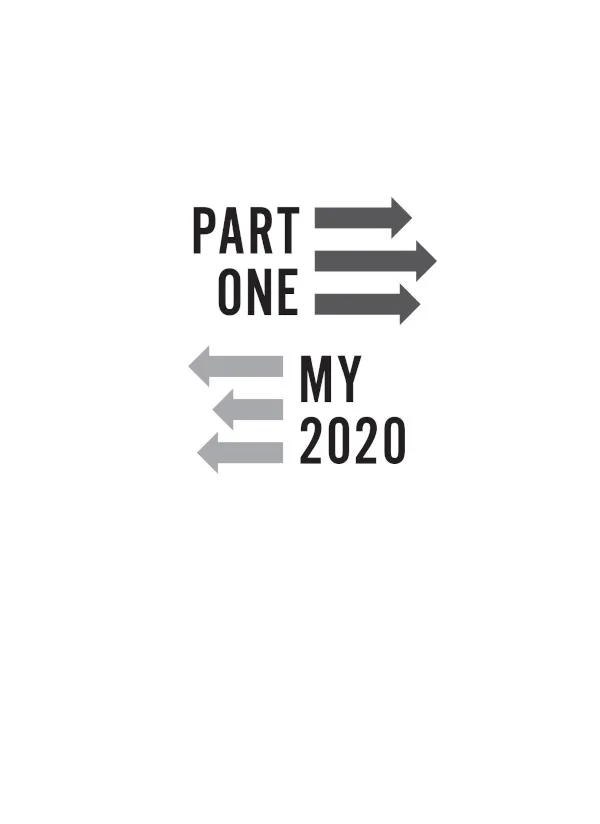CHAPTER ONE
BATTLE OF THE BUCKETS
Difference is inevitable. Division is a choice.
Our nation chose poorly.
The church followed suit.
In our current cultural climate, there are no neutral topics or neutral people. Everything and everybody is politicized and forced to fit neatly into one of two buckets.
A red one or a blue one.
This isn’t new. Political polarization has been a national reality for decades. But during 2020, the messy but often productive middle ground all but disappeared. As a result, Americans were pressured to move further right or further left or be left behind.
Lines were drawn where lines were deemed unnecessary in the past.
Everything became a point of contention. School closings. School openings. Masks. Protests. And, of course, Anthony Fauci. Republicans loved him. Then Democrats claimed him.
With the collapse of the middle, nuance left the building. Without nuance, comments are taken more literally than intended, and productive discussion around complex topics becomes virtually impossible. The result: you’re for me or you’re against me. It’s all or nothing. But every adult knows the world doesn’t work that way. Nothing works that way. That way of thinking ensures that things won’t work.
But, as every political pundit knows, “all or nothing” sells. “All or nothing” gets votes. It’s a donation magnet. A brand builder.
People should know better. Christians in particular.
Unfortunately, and to the point of this book, churches, church leaders, and prominent pastors (along with high-profile leaders of faith-based organizations) took their cues from culture and vacated the middle. To our shame they added their voices to those of their secular counterparts. Not wanting to be left out—and certainly not left behind—we entered the partisan fray. We did what everyone else was doing, pretty much the way they were doing it. We sided publicly with a party and a candidate—and defended both regardless.
In short, we forgot what it means to be Christian.
In the first century, Christian was a political term, not a religious one. First-century followers of Jesus weren’t branded Christian to differentiate them from Zeusians or Jupiterians. The term Christian was coined based on Latin political terminology. Christian was analogous to other political associations such as Caesariani, a follower of Caesar; Herodiani, a follower of Herod; or later, Neroniani, a follower of Nero.1 Non-Christians in Antioch, where the term Christian was first coined, viewed followers of Jesus as political partisans of a king. In time, to be called Christian would mark a man or woman as anti-Roman, not anti-religious. Christians were viewed as threats to the state not because of what they believed. Christians were viewed as threats to the state because of who they chose to obey.
Rome had little interest in which god or gods people chose to worship. Their concern was political. Imperial. People were allowed their many gods.
But only one king.
Rome’s mandate was unambiguous:
Worship your Christ.
Obey Caesar.
Separating sacred from secular was not an issue for idol-worshiping pagans. But for Christians, it was a nonstarter. Jesus was a king who required his subjects to obey him rather than worship him. In the book of Acts, Christian is found exclusively on the lips of critics.2 It was a slur, an insult.
Imagine that.
In the first century, no one asked Christians if they were Christian.
They were accused of it.
It was evident.
It was evident because of how they behaved. Their behavior underscored fidelity to a king.
NOT SO EVIDENT
In 2020 what has been true for some time became evident. We have reduced our faith to faith. Believing is enough. Which leaves us free to pack up our static beliefs, our internalized religion, and run to our political corners of choice. As a result, many, perhaps most, Christians feel more comfortable with and feel they have more in common with people who share their political views than people who share their Christian faith. This is almost always the case when Christianity is reduced to faith. But a Christian faith reduced to belief is a faith neither Jesus nor the apostle Paul would have recognized.
When Christianity is reduced to belief, we lose our voice. We lose our distinction. We’re easily reduced to a constituency, a voting bloc that can be wined, dined, lied to, and bribed. By reducing Christianity to a pagan bifurcation of sacred and secular, we’ve abandoned our opportunity—our responsibility—to serve as the conscience of the nation. Once the church relegated Jesus to the role of forgiver of our sins rather than King of our lives, we opened the door to lesser kings. Thrones never remain empty long.
Consequently, unlike the original Christians, nobody is accusing us of being members of the party of Christ.
No politician anywhere is frustrated with the stubborn Christians in their district who refuse to align themselves publicly with their party and insist instead on behaving like their Lord. Refusing to submit our lives to the Jesus of the Gospels sets us up to be seduced to believe that by leveraging, perfecting, and baptizing the tools and tactics used by the kingdoms of this world, we can further the cause of Christ. Boycotts, voter guides, protests, suing state and local governments, calling out politicians by name from the pulpit—these are the new spiritual disciplines. And if implemented consistently, with God’s help, we can take our country back! We can win!
Which would be fantastic if the win really was winning. But Jesus didn’t come to win the way we define win.
He came to lose. And he invited us to follow him.
We’re not in it to win it. We’re here for something else. Something the apostle Paul understood the moment he regained his sight. Something Jesus followers in Antioch understood and embraced. Something that changed the world. Something that could change the world again.
WINNING AT WINNING
The apostle Paul defined his win. In doing so, he defined ours as well.
Though I am free and belong to no one, I have made
myself a slave to everyone, to win as many as possible.3
A slave to everyone? Really, Paul? Even members of the other political party? A slave to people you disagree with? Seriously?
It’s important to remember that Paul wasn’t asking gentiles to recognize the next step in God’s unfolding story of redemption. He was asking them to abandon their entire worldview! He wasn’t asking folks to add another idol to the mantle. Following Jesus would require them to empty the mantle and destroy their images. Including . . . including household deities linked to the centuries-old tradition of ancestor worship. “Sorry, Granddad. I’m a Christian now. Into the fire you go!”
He continues:
To the Jews I became like a Jew, to win the Jews. To those under the law I became like one under the law (though I myself am not under the law), so as to win those under the law. To those not having the law I became like one not having the law (though I am not free from God’s law but am under Christ’s law), so as to win those not having the law.4
What a coward.
Poser.
Pretender.
Come on, Paul. Choose a position! You can’t stand in the middle. You’re either hot or you’re cold. Are you afraid of losing followers? Are you trying to have it both ways?
Those were sentiments communicated by a good many conservative church folks toward their pastors in the months leading up to the last election. Pastors, like me, who refused to politicize our churches despite intense pressure and criticism. Our refusal to take a side was interpreted as refusal to take a stand—though, in fact, we had taken a stand. We were correctly and courageously refusing to politicize the ekklesia of Jesus. We were demonstrating our commitment to the Great Commission. We refused to alienate half our community by siding with one political party over the other. We chose to stand with Jesus in the messy middle, where problems are solved, rather than capitulate to divisive, broad-brush political talking points.
It’s difficult to take a Christlike stand when pressured to choose a political side. It’s hard to follow Paul’s example when so many in the church prefer we simply preach like pundits. Still, like the apostle Paul, many courageous, gospel-centered pastors weren’t in it to win an election. They were in it to win people. They weren’t in it to save America.
They were in it to save Americans.
Americans on both sides as well as those on no side of the political divide. They were accused of being fearful when, in fact, they were remaining faithful, despite pressure from deacons, elders, and donors to do otherwise.
I faced—and continue to face—my share of criticism. Dozens of families reached out to let me know they were leaving our churches because I had bought into the Democratic narrative. When was I going to take a stand? What was I afraid of?
It was disappointing. Discouraging. But no one threatened to feed me to wild animals or substitute me for a tiki torch.
For the record, Paul’s stubborn refusal to take a side then is why his letters are available to us and are relevant for us now. His willingness to stand alone against unimaginable pressure to do otherwise is why his letters and his story shaped Western civilization. What he writes next is one of my favorite statements in the New Testament. It’s his mission and strategy statement. First his strategy:
I have become all things to all people . . .5
Translated: I’m a spy! I do whatever is necessary to blend in with my surroundings. I work hard not to blow my cover. I’ve learned to build and navigate relationships with people ...

